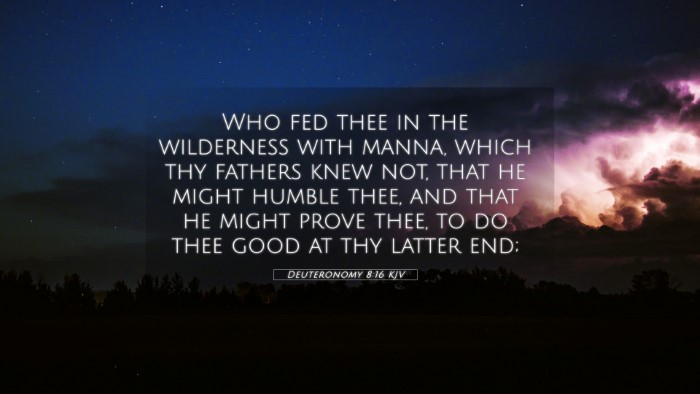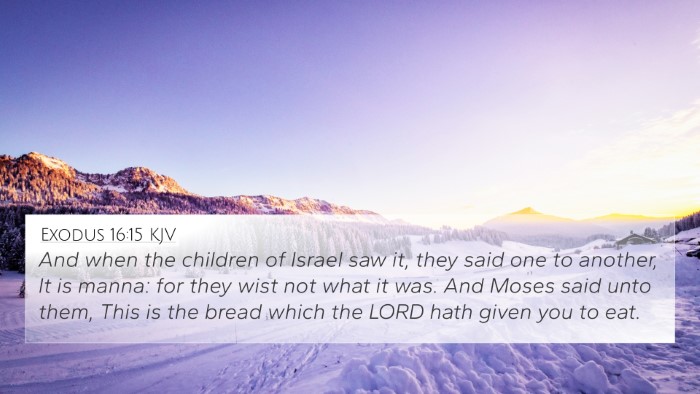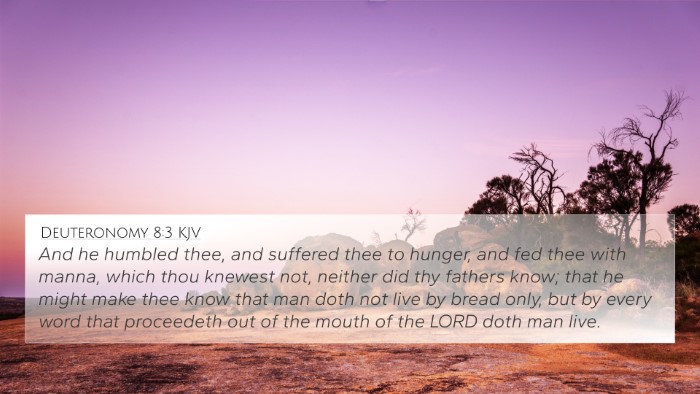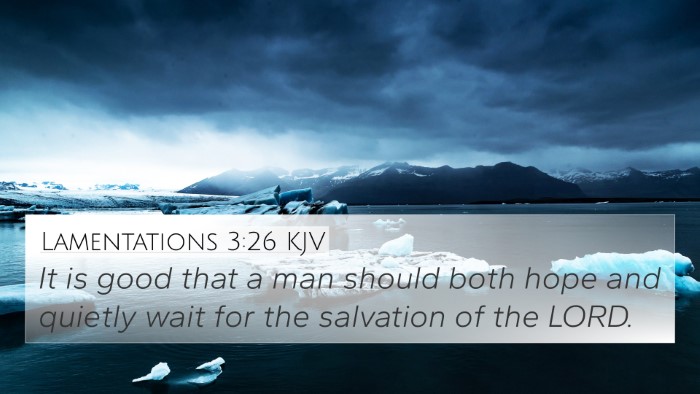Understanding Deuteronomy 8:16
Bible Verse: Deuteronomy 8:16 - "Who fed thee in the wilderness with manna, which thy fathers knew not, that he might humble thee, and that he might prove thee, to do thee good at thy latter end;"
Summary of Meaning
This verse reflects on God's provision for the Israelites during their journey through the wilderness. It emphasizes the dual purpose behind this provision—the humbling of the people and the testing of their faith. The ultimate goal described in the verse is the good that comes at the end of their journey, underscoring God's continual care and purpose in their experiences.
Insights from Public Domain Commentaries
-
Matthew Henry:
Henry elaborates on the lesson of reliance on God and how the Israelites needed to recognize that their sustenance came from Him alone. The provision of manna was designed to teach them humility, guiding them to depend not on their own strength but on God's sufficiency.
-
Albert Barnes:
Barnes points out that the miraculous supply of manna serves as a reminder of the need for spiritual nourishment. He notes that this passage also underlines the importance of obedience and the testing of faith as essential components of a life devoted to God.
-
Adam Clarke:
Clarke discusses the significance of the phrase "to do thee good at thy latter end". He comments that God's ultimate intention is not just to provide for our physical needs but to prepare us for a greater purpose and future blessings—to shape us for His kingdom.
Connection to Other Bible Verses
Deuteronomy 8:16 connects richly with various scriptures throughout the Bible. Here are important cross-references:
- Exodus 16:4: God's promise of manna in the wilderness, illustrating His provision.
- Matthew 4:4: Jesus cites Deuteronomy to emphasize that man lives not by bread alone, signifying spiritual sustenance.
- Psalms 78:24-25: A poetic recount of God's provision of manna and its miraculous nature.
- Philippians 4:19: Assurance that God will supply all our needs, resonating with His provision in the wilderness.
- James 1:12: A reminder of the blessings that come after enduring trials, akin to the testing in the wilderness.
- 1 Corinthians 10:3-4: Paul references the Israelites' spiritual food, linking it to Christ as the true sustainer.
- Hebrews 3:17-19: Warning against disbelief like that of the Israelites in the wilderness, maintaining the theme of faith and testing.
Thematic Connections
Exploring the broader themes stemming from Deuteronomy 8:16 sheds light on significant biblical narratives:
- Humility: The need for believers to acknowledge their dependence on God.
- Testing of Faith: The faith journey often involves challenges that purify and strengthen belief.
- Provision and Gratitude: Recognizing and appreciating God's ongoing sustenance and grace in our lives.
- Enduring Trials for Greater Good: Trusting that present hardships contribute to spiritual growth and benefits.
Using Cross-References in Bible Study
Using tools for Bible cross-referencing enhances your understanding of scripture. Here are some methods:
- Bible Concordance: Utilize a concordance to find related themes and scriptures.
- Cross-Reference Bible Study Guide: Study specific verses alongside their contexts for deeper insight.
- Comparative Bible Verse Analysis: Compare similar verses to unveil layers of meaning.
- Bible Reference Resources: Look for commentaries and guides that help connect verses thematically.
- Using Cross-Chains: Explore the interlinking of various scriptures to see the narrative flow throughout the Bible.
Conclusion
Deuteronomy 8:16 serves as a vital reminder of God's faithfulness and purpose in our lives. The verse, combined with insights from esteemed biblical scholars, encourages believers to see their own journeys through the lens of humility, testing, and ultimate divine goodness.
Consider this verse in context as part of a larger dialogue among the scriptures, recognizing its parallels to New Testament teachings and the overarching themes of provision and faith.











